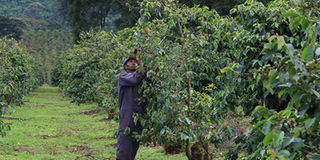Coffee farmers risk losing land over unpaid loans

Hillary Wambugu inspects coffee bushes affected by Bacterial blight, in Nyeri on May 23, 2018. Unfavourable weather is affecting farmers' profits. PHOTO | FILE | NATION MEDIA GROUP
What you need to know:
- According to a coffee expert, debt waiver in co-operative societies is not sustainable since it emanates from over-borrowing and bad governance by officials running the societies.
- Mr Munyiri gave his title deed as collateral for the loan. He maintains that the fluctuating market prices have rendered him unable to service his debts.
A section of coffee farmers in Nyeri risk losing their land to the government and banks for failure to service loans they borrowed to improve their farms and factories.
Five factories under the Mathira North Co-operative Society owe the Co-operative Bank Sh10 million they borrowed to pay farmers for cherry delivered in 2015/16.
Although President Uhuru Kenyatta wrote off Sh2.4 billion owed by farmers to financial institutions, including savings and credit co-operative societies (Saccos), some co-operatives are yet to benefit from the waiver three years on.
Speaking during a campaign trail in Kirinyaga in 2016, the President asked farmers who had provided their title deeds as collateral to go and collect them.
“We heard something of the sort, but we did not benefit from the waiver which could have alleviated the problems we are in,” said Mr David Maina, the chairman of Mathira North Co-operative Society.
GOVERNANCE
He said they tried to follow up with the district co-operative officer without success.
Since its closure for operating on a deficit, farmers have abandoned their farms while some sell their coffee to hawkers.
“We wish the government could help us revive the factories so that farmers can have a source of income and improve the region’s economy,” Mr Maina said.
According to coffee expert Robert Thuo, debt waiver in co-operative societies is not sustainable since it emanates from over-borrowing and bad governance by officials running the societies.
“It is high time the Office of the Director of Public Prosecutions probes what’s going on in co-operative societies supported by forensic audits,” said Mr Thuo.
Tumbling coffee prices offered by buyers through direct sales and the Nairobi auction and the changing weather patterns have contributed to the non-payment of loans to the Commodities Fund, a State corporation, which is threatening to take over property owned by farmers.
DEBT WAIVER
Coffee estate farmers are also in deep trouble with the government for loans they took to buy machines and construct a pulping station.
Mr James Munyiri, 85, has been cultivating coffee on his 25-acre farm in Mathira constituency for the last 50 years, producing at least 60,000 kilos of cherry. However, this has dropped by a third in the recent past.
On July 2014, Mr Munyiri borrowed Sh750,000 from the corporation at 10 per cent interest rate to buy farm inputs and finance his operations, including setting up a pulping station.
The money, which he was supposed to repay in two years, has since accumulated to Sh1,063,562.
Commodities Fund is a State corporation mandated to provide sustainable affordable credit and advances to farmers through the Co-operative Bank.
Mr Munyiri, who doubles up as the vice chairman of over 70 coffee estate farmers in the county, wants the government to waive their debts to salvage their property.
“For people conversant with the trends in the coffee sector, they would know that times are hard and not issue threats. The government should waive the debts we owe,” he said.
MARKET PRICES
In a recent letter addressed to Mr Munyiri and seen by the Nation, the corporation is demanding that he repays his loan.
“You will realise that the monies owed to the Fund translate to a civil debt and as such it (the Fund) intends to pursue it through various legal channels including liquidation of any securities deposited,” the letter reads in part.
Mr Munyiri gave his title deed as collateral for the loan. He maintains that the fluctuating market prices have rendered him unable to service his debts.
At least 60 bags of clean coffee produced from his farm in the last season is being held at his marketers’ warehouse as they await favourable prices.
Mr Munyiri says production has dropped, fetching him little to sustain himself and repay his loans.
“I have not refused to repay the loan, but coffee has not been earning me enough to service the debt,” he said.
The corporation noted that Mr Munyiri had defaulted on regular payments of the loan that continues to accrue interest until the payment is done in full.
CHALLENGES
He is now required to pay Sh550,000 by the end of next month and clear the balance by the end of the year.
“I will starting picking the early crop in June, but where will it go since the last season is still in the stores?” he posed.
Mr James Ngobia borrowed Sh1.5 million from the corporation in 2014 but the amount has now accumulated to Sh2.2 million.
“Coffee prices have gone down thus affecting our ability to repay the loans on time,” he said.
Mr Ngobia has since gotten into an agreement with the State agency to pay Sh5,000 per season, meaning he will be paying Sh10,000 per year.
He said his crop has failed in four consecutive years due to harsh weather, leading to a decline in production.
“The challenges that the small-scale farmer undergoes are the same ones large-scale farmers go through. The government should intervene so that we can have our title deeds back,” he said.





